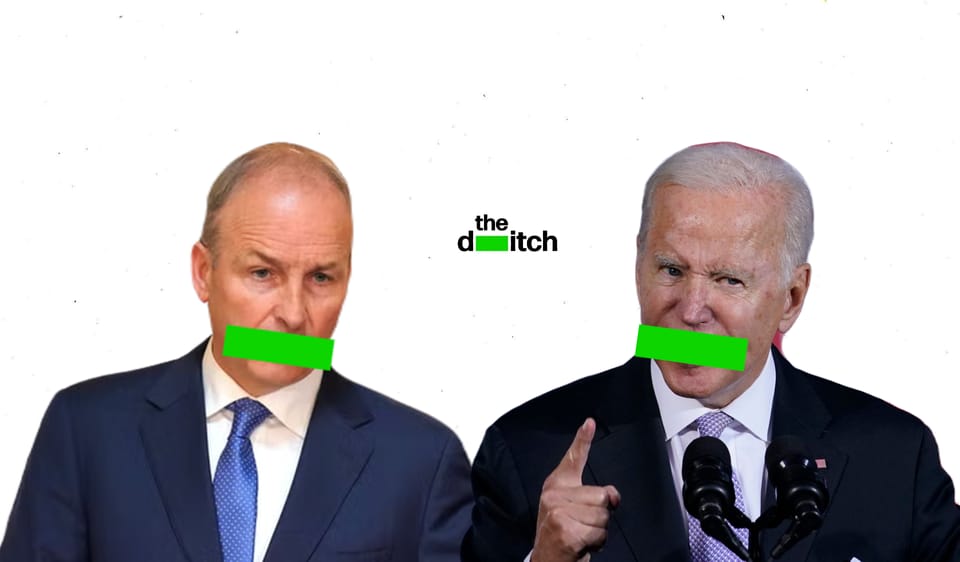By Paulie Doyle. Originally published in The Ditch's State Failures.
If it wasn’t for American leadership, and if it wasn’t for America and Europe working together, I don’t know what kind of world we’d live in.
- Leo Varadkar
You’ve met them – a lot of Americans identify as Irish.
Their family history typically goes like this. An ancestor, perhaps a great grandpappy, left his poverty and famine-stricken homeland in search of a better life, gathered whatever possessions he could carry, hopped on a boat, presumably a coffin ship, and sailed across the Atlantic. Though he lived the rest of his days in the United States, Great Grandpappy held on to his cherished Irishness – and, crucially, passed it on to his kids. There are roughly 36 million Irish Americans living in the US, according to recent data from the US Census Bureau. They can be found knocking about Temple Bar, standing in crowds, bovine-like, inside the campus of Trinity College, and, on occasion, kissing the Blarney Stone.
At some point – though it’s difficult to pinpoint exactly when this happened – a sizable cohort of Irish people whose families never emigrated to the US began to identify as Americans. They have no direct affiliation with the land of the free and the home of the brave, yet have adopted American values, customs and norms. Don’t pretend that you aren’t aware of what I'm talking about. You see them in every city, in every town, across Ireland. These people look like Americans, walk and talk and act like Americans, long for Ireland to be the 51st state in the Union and know more about US politics than the politics of this island. But they’re not Americans. They’re Irish.
The proliferation of US culture is undeniable; there are signs of American influence almost everywhere on Earth. Go to Vietnam, a place that to this day proudly displays to tourists the uniform worn by John McCain when he was captured, and you’ll meet people unfortunate enough to know who Amy Schumer is. Anyone travelling to Venezuela, regularly invoked as emblematic of the deprivation associated with socialism, can stop for a Big Mac in Caracas if they please. In 2010, a Wikileaks cable revealed how Saudi officials believe US television shows like Desperate Housewives were softening the opinions of Saudis towards the United States.
In his book The Broken Harp, Identity and Language in Modern Ireland, the writer and biologist Tomás Mac Síomóin convincingly argues that the historic colonisation of the Irish, first by the British and then by the Catholic Church, has primed us for a form of neocolonialisation: globalisation, a force that Americanises cultures around the world. “The Third Colonization of the Irish Mind pertains basically to the invasion of, or absorption by, the Irish psyche of contemporary Anglosphere consumerist values that arrive as both overt and subliminal components of [American culture],” he writes, of the modern Irish subject.
Globalisation has Americanised Ireland more than most other countries. And there are good reasons for this. Let us put aside for a moment the historic suppression of Irish culture and language and a national psychology already shaped by colonialism and emigration. Our economy is subject to the whims of external forces: the European Union, our old friends the Brits and – you’ve guessed it – the US. Ireland is perpetually preening for US multinationals, whose tax receipts make up a huge chunk of our annual budget. American cash, American approval, isn’t just important culturally – it sustains Ireland. And this valoring of the US, and to a lesser extent Europe, as harbingers of progress influences how Ireland understands itself.
It is widely accepted that modernity eluded this country for a lot of its history; stuff like bodily autonomy, gay rights and late licences were the preserve of the millions of people who had emigrated. This perception changed with the advent of the Celtic Tiger, a new prosperity that brought with it a sense of cosmopolitanism and self-importance. Fukuyama declared the end of history; the Troubles were ending – Ireland had caught up with other modern countries and could aspire to be even more like them down the line. The legacy of this falsehood, I am convinced, is an assumption that now presides over much of our political discourse: that events or people in this country are merely our own Irish version of things that have already occurred elsewhere.
The Irish Trump/Westboro Baptist Church/Jersey Shore
Let me give you an example. When a Z-list celebrity businessman and reality TV star ran for the Áras a few years ago, making racist comments about Travellers along the way, right-wing commentators asked, with great excitement, whether Peter Casey was the Irish Donald Trump, as though the relationship between Irish politics and American politics was akin to the relationship between Jersey Shore and Tallafornia – a tawdry imitation. Comparisons like this are seen across the political spectrum. Around 2015, I stood at a protest outside the so-called Life Institute in Dublin alongside several activists calling for a repeal of the eighth amendment to the constitution. Brandishing a megaphone, one of the organisers referred to Youth Defence as “the Irish Westboro Baptist Church”, as though those who run the Irish anti-abortion movement are meaningfully similar to a cult in Topeka, Kansas, roughly 4,000 miles away. In 2020, well-meaning activists claimed that, following his violent death at the hands of An Garda Síochána, George Nchenko was “the Irish George Floyd”, inviting us to sympathise with him on those grounds. But Ireland does not need to look abroad to explain what happens here. Casey would be a fool if Donald Trump didn’t exist. George Nchenko is a victim on his own terms – irrespective of how US police officers treat African-Americans.
Another factor at play is the great value we place in our special relationship with the US. But unlike the Brits, who labour under the delusion that they meet the Yanks as equals, Ireland takes pride that a small nation such as ours has a direct line to the US president. Significant efforts are made to sustain and nurture this friendship. We send the taoiseach to Washington every St Patrick’s Day, bowl of shamrocks in hand, for a pat on the head. Most people across Ireland celebrated the visit of Joe Biden in April – as they have with every American President to pay a visit to Ireland. During Biden’s trip, the US was engaged in conflicts in Yemen, Somalia and Syria – as well as enabling the fascist Israeli government to continue its brutal, inhumane treatment of the Palestinian population in Gaza and the West Bank [1] . The Irish political class – politicians, media lackeys and Leinster House-adjacent types – including the “anti-imperialists” in Sinn Féin, remained mute on US foreign policy. Instead, Ireland became a giant Carrol’s, with outbreaks of mass jigging punctuated by hacks asking Biden what he likes on his chicken fillet roll.
The benefit to morphing into a nation of hideous ape-like Paddys whenever American money or approval is at stake, we are told by people like Leo Varadkar, is that Ireland punches “well above its weight” in international affairs. But this is a false consciousness. Behind all the abject Paddywhackery is an unpleasant fact: Ireland has accepted its cultural and economic subordination in the name of ascending to the status of a grown-up, modern country. It’s a rejection of the lessons learnt from hundreds of years as a colony and a refusal to meaningfully express solidarity with people now being brutalised by imperialism – as we were. Ireland strives for a place among its betters, instead of standing alongside the global south. Solidarity exchanged for Starbucks.
Only a country utterly deferential to American power would behave this way. Who but a nation of serfs and simps would find themselves constantly searching for, however tenuous, any connection that famous Americans might have to Ireland. Walt Disney? Irish. Springsteen? Irish. Obama? An Irishman who warrants his own dedicated plaza in Offaly. Dublin, meanwhile, has become a theme park for American tourists. The thousands of Yanks who come here each year are regarded as sacred to such an unedifying degree that when a highly irritating American musician was beaten up by teenagers this summer, the minister for justice called him personally to apologise, following a newspaper campaign that saw his two sons con the Irish public out of a sum north of €100,000.
And in this image is a summary of our relationship with the United States: an elected official grovelling to a man in a cowboy hat, believing they are doing what’s in the national interest.
Paulie Doyle writes for The Ditch.
[1] As of October 2023, the United States has now also facilitated the genocide of Palestinians. They vetoed UN resolutions calling for a ceasefire following a criminal Israeli assault on Palestine that has included the shutting off of food, water and electricity to 2.2 million people – and has resulted in a death toll in the tens of thousands. Biden, the head of a vicious, dying empire, has announced at least $14.3 billion in aid to Israel. Sinn Féin, the populist left-leaning government in waiting, declined to condemn what was happening in the strongest possible terms, for fear of upsetting the Americans. But that’s for another day.


